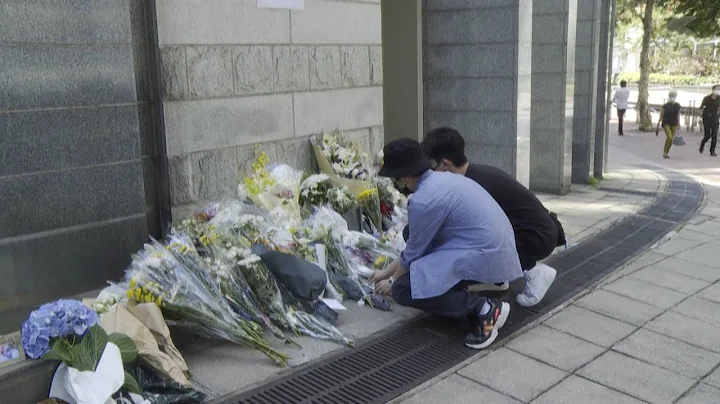Zhang Taiyan, Hong Kong's "Life Daily" published a condolence article signed "Feng" on June 16, 1936. The article read: "We pay special tribute to Mr.
Taiyan, These are his recent comments on the Peking student national salvation movement. ...He said, "It doesn't matter whether he is a Communist or not, it just depends on his current actions to see if he is truly patriotic." This is so clear and correct. "Zhang Taiyan, as a famous scholar and revolutionary in modern history, has been recognized by future generations. Although the Nationalist Government issued a state funeral order for him at that time, his coffin has been temporarily housed in Suzhou . It was not until 1955 that the People's Government buried him in the cemetery he selected during his lifetime.

Zhang Taiyan (1869-1936), named Xuecheng, later changed his name to Binglin, given the courtesy name Meishu, and also given the nickname Taiyan. He was a native of Yuhang, Zhejiang. Shao studied classics and history from Yu Yue. In 1897, while working at the "Current News" and "Jingshi Bao", he was wanted for participating in the reform movement . In 1899, he traveled east to Japan and met Sun Yat-sen. In the same year, he returned to Shanghai and served as editor of " East Asia Daily ". In 1902, he went to Japan again and called for the overthrow of the Qing government. He formed the China Education Association with Cai Yuanpei and others and established the Patriotic Society. In 1903, he was arrested for publishing anti-Qing revolutionary remarks in the Su Bao. After being released from prison in 1906, he went to Japan and joined the Chinese Communist Party Alliance. In 1909, he reorganized the Chinese Communist Party Guangdong Association with Professor Tao Chengzhang and others and became the president. After the Revolution of 1911, he successively served as Privy Counselor of the Nanjing Provisional Presidential Palace and President of the Federation of the Republic of China. After Yuan Shikai became president, he was called to Beijing and participated in anti-Yuan activities after Song Jiaoren was murdered. In July 1917, he served as Secretary-General of the Generalissimo's Office in Guangzhou. The Kuomintang, which broke away from Sun Yat-sen in 1924 and was reorganized, set up conferences and gave lectures in Suzhou and was engaged in academic writing and education work for a long time. He died of illness in Suzhou on June 14, 1936 at the age of 67. He left behind approximately 4 million words of academic works and was recognized as a master of Chinese and Western studies.
After the death of Zhang Taiyan, people from all walks of life Feng Yuxiang, Yu Youren, Li Liejun, Shen Enfu, Huang Yanpei, Chen Taoyi, Zhang Qun, Zhang Xueliang, Yang Hucheng, Sun Ke, etc. Messages of condolences were sent to his family one after another. Later, a memorial service for Zhang Taiyan was held in Shanghai. Less than a hundred people came to express condolences. Some people took the opportunity to spread rumors and stir up trouble. They even compared Gorky, who died in the same year, with Zhang Taiyan, saying that young people are not as good as foreign scholars to their own country. Gorky's admiration and enthusiasm, all of which are intended to erase his combat achievements in the first half of his life. Lu Xun keenly saw through his intentions and wrote the article " Two or Three Things About Mr. Taiyan". The article writes: Although Mr. Taiyan also appeared as a revolutionary before, he later retreated to a quiet scholar, isolated from the times with walls built by his own hands and helped by others. …I think that Mr. Wang’s legacy is actually greater in the history of revolution than in the history of academics.
This is exactly the case. Zhang Taiyan once wrote a piece of "Self-Encourage" before and after the Revolution of 1911: Who can take charge of Yi and Yin on his shoulders, and the uneasy heart on the bottom of his feet.
This shows his ambition to govern the country and bring peace to the world, and to serve the country even if he dies. Determination that never fades. Lu Xun once made the following evaluation of his life: "After examining his life, he used a large medal as a fan pendant and approached the gate of the Presidential Palace to criticize Yuan Shikai for harboring evil intentions. There was no other person in the world. Seven were hunted down and three were imprisoned. There is no other person in the world who has never given up his revolutionary ambition: this is the spirit of the sages and the model for future generations."
The National Government issued a state funeral order on July 9, 1936, praising him for "his early years." The text advocates national revolution, and he resists the imperial system and protects the law, enduring hardships and perseverance." People from all walks of life, such as Feng Yuxiang, Ma Xiangbo , Li Xiehe , Li Yinquan, Feng Ziyou, Qian Xuantong, Gu Jiegang, Hu Pu'an, Zhang Jusheng, Wu Chengshi, Xu Shoutang, etc. all sent elegiac couplets. . Some elegiac couplets not only praise Zhang Taiyan's academic achievements, but also make due evaluations of his revolutionary achievements.Cai Yuanpei wrote in the elegiac couplet: It has been more than two hundred years since Taichong and Yanwu drove the Tatars and restored China, and they have become their own family with Quyuan and Zhongrong.
In the elegiac couplet, Ouyang Jingwu gave an objective evaluation of Zhang Taiyan's outstanding contributions in both the revolution and academic aspects: It was difficult to support a tree, and the martyr only lectured in his old age; while he was sleeping with all kinds of worries, who was fishing in the Han Dynasty in Tongjiang.
Ma Xiangbo, who was 97 years old at the time, said in an elegiac couplet written in vernacular: To speak justice on behalf of the people and speak upright words for the party and the country, how wonderful! You can die in peace; your literature is like Huanglizhou , and your conduct is like that of a Gu Ning person. How fashionable! I won’t be hurt either!
Because Japan had been peeping at China for a long time at that time and the country was in crisis, Zhang Taiyan could not be buried properly. His family temporarily kept his coffin in their residence in Suzhou. Before his death, Zhang asked Du Zhiyuan to find a burial place for him:
Liu Bowen was a great hero of China. With the wish of Shen Jiuyuan, it is like Zhang Cangshui who was buried from King E. Since you grew up in your hometown, you would like to find a place for me. Regardless of Feng Shui, I hope the land is slightly high and open, close to the Liu family's tomb.
After the founding of the People's Republic of China, Premier Zhou Enlai was very concerned about Zhang Taiyan's funeral and asked Jiangsu and Zhejiang provinces to "handle it solemnly." On April 3, 1955, the People's Government officially held a make-up funeral ceremony for Taiyan, and in accordance with Zhang Taiyan's wishes during his lifetime, Zhang Taiyan was buried. His body was moved to the tombs of Zhang Huangxi, an anti-Qing patriot, and Yu Qian, a national hero, at the foot of Nanping Mountain in West Lake, Hangzhou. On the towering tombstone, there is "Zhang Taiyan's Tomb" engraved in Zhang Taiyan's handwriting (written when he was under house arrest by Yuan Shikai)
In July 1976, Zhang Taiyan's student Lin Yin published Zhang Binglin's life and academic work in Taipei's "Confucius and Mencius Monthly" The article reads: "Since Binglin has passed away, the National Government commemorated Yuan Qi and honor him with a state funeral. His tomb was buried at the foot of Zhongtai Mountain in Hangzhou. However, with frequent national disasters, he has not yet been able to bury him." Apparently Lin At that time, Mr. Yin did not know that Zhang Taiyan had been buried in Hangzhou for more than 20 years.
In June 1986, the 50th anniversary of Zhang Taiyan's death and the Zhang Taiyan International Academic Symposium were held in Hangzhou. At the same time, the Hangzhou Municipal People's Government allocated more than 400,000 yuan to build a Zhang Taiyan Memorial Hall next to Zhang Taiyan's tomb.




















![Robert Miles - Children [Dream Version] - DayDayNews](https://i.ytimg.com/vi/CC5ca6Hsb2Q/hq720.jpg?sqp=-oaymwE2CNAFEJQDSFXyq4qpAygIARUAAIhCGAFwAcABBvABAfgB_gmAAtAFigIMCAAQARghIBwofzAP&rs=AOn4CLCH8rHZ4UmXMtY9JL6dvA8OeLfEww)
